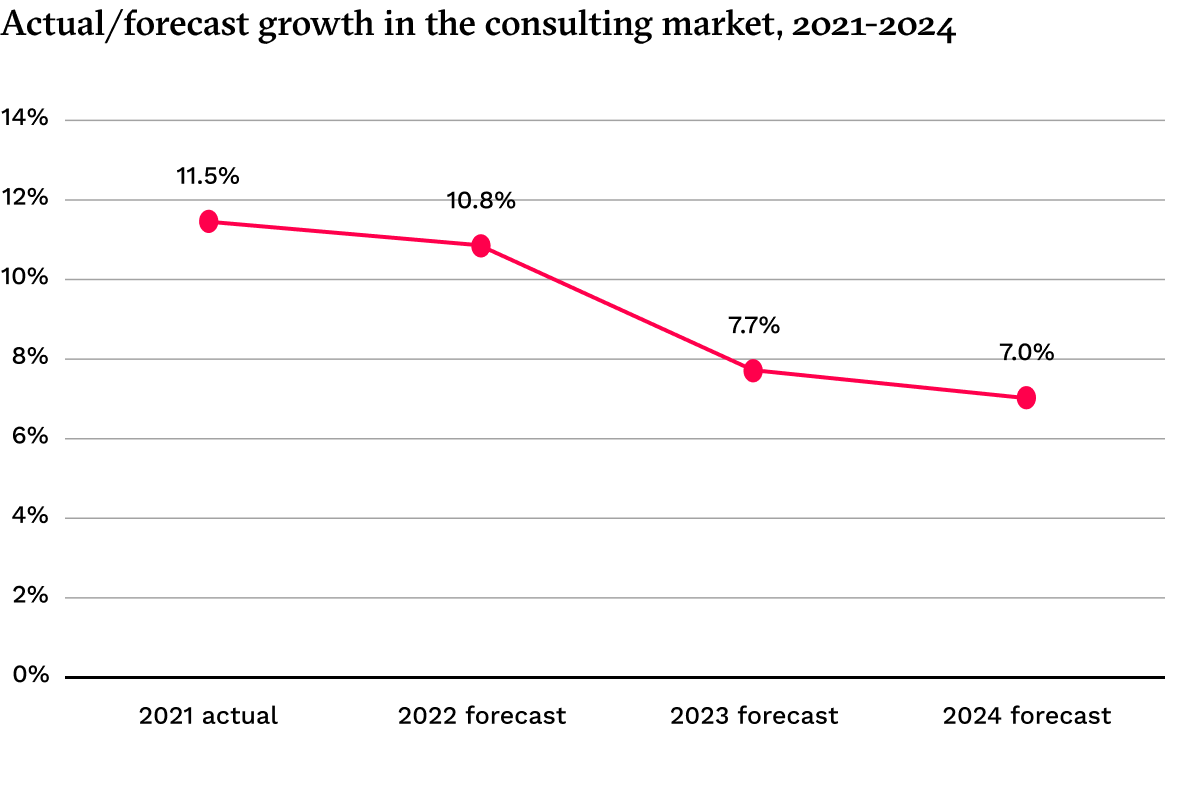Our forecast for consulting services in 2023
Growth in the consulting market in 2023 is likely to be similar to pre-pandemic levels. But don’t be fooled: This is anything but a stable market.
After exceptional growth in the consulting sector in 2021 and the first half of 2022, and the uncertainty that characterised the second half, it seems likely that, while 2022 may turn out not to have been as good a year as many consulting firms had initially expected, it will have been much better than many may have feared.
Our modelling predicts a slowdown in the rate of growth from 10.8% in 2022 to 7.7% this year and 7.0% in 2024.

This brings the industry back into line with its performance in 2012-19, but—as is often the case—headline numbers can be deceptive.
In the years leading up to the pandemic, and especially from 2015 onwards, growth in the consulting industry came from one area: digital transformation. Tapping into client concerns about the failure of technology projects to deliver the level of change their organisations needed, digital transformation offered the promise of significant improvements in performance stemming from the implementation of new technologies. Existing IT budgets, focused on the incremental improvement of legacy systems, were re-purposed, fuelling very high growth in an embryonic market. Growth rates for digital transformation exceeded 50% in some markets in 2015-17 but came at a cost: digital transformation cannibalised much existing and planned expenditure, not just in the IT function but in other parts of the business. Thus, while digital transformation grew, demand for most other consulting services shrank. Not surprisingly, by 2018, strategy firms were telling us that 50% of their business came from digital transformation. Of course, this switch wasn’t simply about money: Consulting firms of all types, keen to align themselves with a high-growth market, were re-badging a significant proportion of their work as transformation. But the main point here is that it was clear where consulting firms had to focus.
Some elements of that picture have carried over into the post-pandemic period. In our most recent client data, 40% of respondents said that transformation (business model, as well as digital) was one of their top three priorities. Asked about which specific services they are likely to use significantly more of in 2023, 37% of clients said cybersecurity; 30% data & analytics; 27% user/customer design; and 23% technology strategy—all of which are key components of digital transformation projects.
So, what’s different this time around? Pre-pandemic transformation almost wholly focused on technology. This was both a strength and a weakness: A strength in the clarity of focus that it brought, but a weakness in the sense that it ignored other critical issues on which the success of a transformation project depended, notably around concrete benefits being delivered and—a not-unrelated point—the extent to which people’s behaviour changed. By early 2020, both of these issues were causing clients considerable concern. Had it not been for the accelerated shift to remote working during the pandemic, one could argue, demand for digital transformation might well have slowed. This time around, clients are clear that success won’t just depend on technology. Twenty percent of clients say that people & change is one of the areas that they’re most likely to use significantly more consulting support, while 17% say that this will be the case where operational improvement is concerned (reflecting the 45% of organisations that say that productivity improvement is one of the areas they’re most focused on as a result of economic uncertainty). On top of this, clients will put intense pressure on consulting firms to deliver concrete results this time around—and quickly. Almost half of clients say that their workload has increased; 40% say the pace of work has accelerated. These are the two main reasons why they’ll turn to consultants for help.
All this means that, while transformation will probably continue to be the single most important factor driving growth in demand for consulting services in 2023, consulting firms need to change the way they deliver transformation.